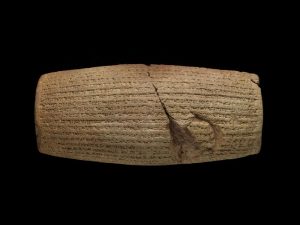Words on the Word
29. Sunday
Isaiah 45:1-6: Thus says the Lord to his anointed, to Cyrus.
1 Thessalonians 1:1-5: You have persevered through hope.
Matthew 22:15-21: Jesus was aware of their malice.
Our first reading today is a text of phenomenal importance. To say something sensible about it, I must put it in context. Forgive me if I start with a few dry facts.
Cyrus, whom we hear about, was king of Persia 559-30 BC. At the time Persa was a burgeoning superpower. Slowly but surely it usurped the role Babylon had played for decades throughout the Middle East. The Scriptures tell us much about Babylon. The Second Book of Kings, the last volume of Israel’s Heimskringla, concludes with Israel’s expulsion into exile in 586. A Psalm sings of their experience there: ‘By the rivers of Babylon’, Israel lamented, ‘we sat and wept. May my right hand whither, Jerusalem, should I ever forget you.’
Israel’s fate was shared by other small nations. Babylon consolidated its might and reduced resistance by moving peoples around within its territory. We know that tactic from modern times, not only from Stalin’s USSR. In 538 Cyrus took possession of Babylon. Persia was recognised as new top dog. Cyrus declared a general amnesty. Captives were released. In the British Museum, there is an inscription from the time of Cyrus. It tells us what happened. Babylon’s kings, Cyrus proclaimed, had displeased local gods by removing their worshippers and causing cults to cease. Cyrus repaired the harm: ‘I returned the images of the gods, who had resided there, to their places and I let them dwell in eternal abodes. I gathered all their inhabitants and returned to them their dwellings.’ He performed this action in the name of Marduk, chief god of Babylon.
What we are dealing with here is Realpolitik. Cyrus wanted to appear as the liberator of nations. He mobilised goodwill by loosening Babylon’s grip. In Israel’s case , the people had for half a century been exiled 2,700 km from home. That corresponds to the distance from Trondheim to Bologna. Cyrus now declared himself the favourite of the national god of the state he had recently toppled. It should appear clearly who was now in charge, ruling by divine right.
Let us remind ourselves how Israel remembered what happened. In the Isaian text we’ve read it says:
Thus says the Lord to his anointed, to Cyrus […]: “It is for the sake of my servant Jacob, of Israel my chosen one, that I have called you by your name, conferring a title though you do not know me.”
Cyrus is called the Lord’s anointed, that’s messiah in Hebrew, christ in Greek. He his chosen, called, and honoured even though he remains ignorant of the Power — the one true God — who is acting in his life. Cyrus is a vehicle of providence, a crucial connecting link in God’s plan of salvation without having an idea of what he is being used for.
This is what is so essentially important. If God is God, which he is, he is the Lord of history. History progresses towards a fulfilment. God uses the processes of history and man’s free choices, choices often ignobly and selfishly motivated, to further in the long term his design: our salvation, the establishment of God’s kingdom, whose birth pangs darkly immerse us.
When we look at today’s world it is hard not to feel disquiet. There are storms everywhere. Lightning conductors we took for granted have vanished. Waters are rising metaphorically and literally. The assembly of the faithful diminishes. God is forgotten. Has the Lord then abandoned us? Of course not. It is simply so darned hard to see the whole thing from his perspective.
I am currently reading a book that has helped me in this respect. The author describes a visit she paid to the old World Trade Center, whose towers were 546 metres tall, back in the 90s when they were still standing:
We took the elevator to the top of one of the towers. Through vast windows, we saw a thunderstorm, well below us, flashing lightning as it moved across the city, from Brooklyn into lower Manhattan. I had never been above a thunderstorm, before – or since. It was magnificent to see something that would be overwhelming or dangerous on the ground reduced to a beautiful entertainment, harmless as a school of tropical fish.
Such experience is transitory. On 11 September 2001 the towers were reduced to rubble. No earthly vantage point is definitive. Yet this vision can give us an idea – inadequate but helpful – of how this world’s destiny plays out in God’s sight. What is overwhelming and dangerous is not magicked away thereby. God took it sufficiently seriously to enter into it and be, seemingly, obliterated by it. He remains here on the ground, with us, until the end of time. But we are reminded that even chaotic, terrible events are part of a process that does proceed towards a blessed resolution. A strange beauty is evident within it even though we cannot yet perceive it, absorbed as we are by present fears, by cries and misery, by collapsing monuments and realms.
A wonderful collect proclaims that God’s providence is unfailing. Providence may well use people who have no idea they are being formed by God’s hand. Therefore no circumstance is hopeless for one who believes. That is a certainty to which we must hold fast determinedly.
‘Not everyone who says to me, “Lord, Lord!”, will enter the kingdom of God’, says Jesus. To merely call him ‘Lord’ can be a form of hypocrisy: the Gospel tells us so today. We must prove that we recognise him as our Master and as Master of the world, rendering to God what is God’s. We do so by remaining ‘tireless in love, persevering in hope’ even when we walk in the eye of the storm and can hardly imagine that, above, there is blue sky and a limitless horizon. Amen.

The Cyrus Cylinder in the British Museum.
Deus, cuius providentia in sui dispositione non fallitur, te supplices exoramus, ut noxia cuncta submoveas, et omnia nobis profutura concedas.
O God, whose providence never fails in its design, keep from us, we humbly beseech you, all that might harm us and grant all that works for our good.

